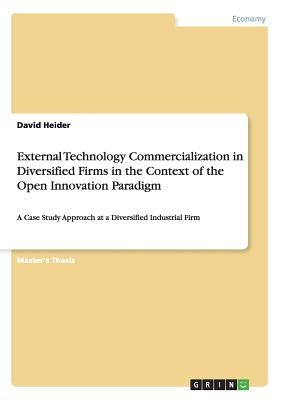
- We will send in 10–14 business days.
- Author: David Heider
- Publisher: GRIN Verlag
- Year: 2012
- Pages: 74
- ISBN-10: 3656157731
- ISBN-13: 9783656157731
- Format: 14.8 x 21 x 0.5 cm, minkšti viršeliai
- Language: English
- SAVE -10% with code: EXTRA
External Technology Commercialization in Diversified Firms in the Context of the Open Innovation Paradigm (e-book) (used book) | bookbook.eu
Reviews
Description
Master's Thesis from the year 2011 in the subject Business economics - Business Management, Corporate Governance, grade: 1,0, Maastricht University, course: Strategy and Innovation, language: English, abstract: Changes in the competitive environment, globalization and the fast technological innovation rate of today have called for a shift in the corporate mindset of industrial firms. The traditional closed model of research and development (R&D) inside the firms' boundaries, which optimally ends with a regular commercialization of the invented product, has increasingly been challenged (Chesbrough, 2003). The emerged concept of the open innovation paradigm comprises corporate activities of either acquiring external knowledge or exploiting internal knowledge besides the traditional ways of product commercialization. The latter refers to knowledge exploitation or more specifically to external technology commercialization (ETC) (Lichtenthaler & Ernst, 2007) and represents the core field of this study. The increased interest in ETC across industries is a trend stemming from industrial and managerial practice rather than from theory (Lichtenthaler, 2010a). However, more and more contributions put their focus on the concept of external knowledge exploitation and its implications (e.g. Fosfuri, 2006; Gassmann & Enkel, 2004; Lichtenthaler, 2005, 2010b). Most of these studies either generally discuss the ETC particularities or specifically examine licensing strategies as means of ETC and their corporate impact. It has been argued that besides the purely financial aspects firms have different motives for engaging in knowledge exploitation activities, such as the access to another company's technology portfolio (Rivette & Kline, 1999), the identification of intellectual property infringements (Koruna, 2004) or the increase in speed of the R&D activities by realized learning effects (Lichtenthaler & Ernst, 2007). This case study concentrates on a firm's s
EXTRA 10 % discount with code: EXTRA
The promotion ends in 23d.03:58:28
The discount code is valid when purchasing from 10 €. Discounts do not stack.
- Author: David Heider
- Publisher: GRIN Verlag
- Year: 2012
- Pages: 74
- ISBN-10: 3656157731
- ISBN-13: 9783656157731
- Format: 14.8 x 21 x 0.5 cm, minkšti viršeliai
- Language: English English
Master's Thesis from the year 2011 in the subject Business economics - Business Management, Corporate Governance, grade: 1,0, Maastricht University, course: Strategy and Innovation, language: English, abstract: Changes in the competitive environment, globalization and the fast technological innovation rate of today have called for a shift in the corporate mindset of industrial firms. The traditional closed model of research and development (R&D) inside the firms' boundaries, which optimally ends with a regular commercialization of the invented product, has increasingly been challenged (Chesbrough, 2003). The emerged concept of the open innovation paradigm comprises corporate activities of either acquiring external knowledge or exploiting internal knowledge besides the traditional ways of product commercialization. The latter refers to knowledge exploitation or more specifically to external technology commercialization (ETC) (Lichtenthaler & Ernst, 2007) and represents the core field of this study. The increased interest in ETC across industries is a trend stemming from industrial and managerial practice rather than from theory (Lichtenthaler, 2010a). However, more and more contributions put their focus on the concept of external knowledge exploitation and its implications (e.g. Fosfuri, 2006; Gassmann & Enkel, 2004; Lichtenthaler, 2005, 2010b). Most of these studies either generally discuss the ETC particularities or specifically examine licensing strategies as means of ETC and their corporate impact. It has been argued that besides the purely financial aspects firms have different motives for engaging in knowledge exploitation activities, such as the access to another company's technology portfolio (Rivette & Kline, 1999), the identification of intellectual property infringements (Koruna, 2004) or the increase in speed of the R&D activities by realized learning effects (Lichtenthaler & Ernst, 2007). This case study concentrates on a firm's s


Reviews